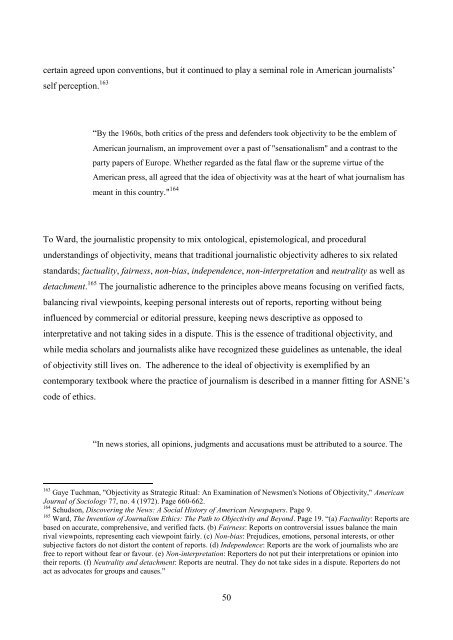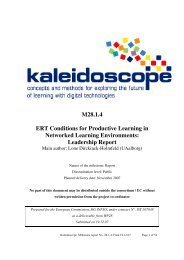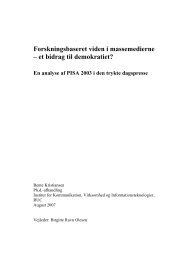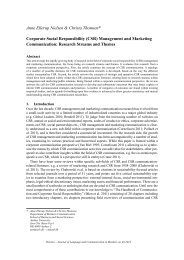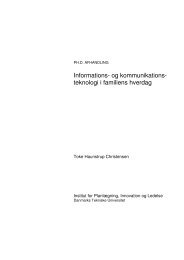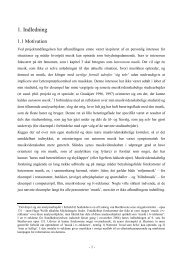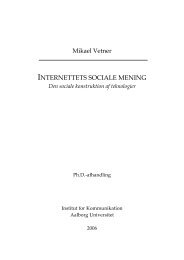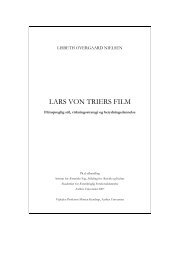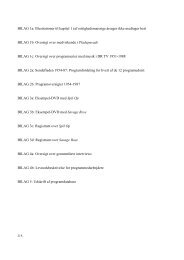The Jeremiad Over Journalism
The Jeremiad Over Journalism
The Jeremiad Over Journalism
Create successful ePaper yourself
Turn your PDF publications into a flip-book with our unique Google optimized e-Paper software.
certain agreed upon conventions, but it continued to play a seminal role in American journalists‘<br />
self perception. 163<br />
―By the 1960s, both critics of the press and defenders took objectivity to be the emblem of<br />
American journalism, an improvement over a past of "sensationalism" and a contrast to the<br />
party papers of Europe. Whether regarded as the fatal flaw or the supreme virtue of the<br />
American press, all agreed that the idea of objectivity was at the heart of what journalism has<br />
meant in this country." 164<br />
To Ward, the journalistic propensity to mix ontological, epistemological, and procedural<br />
understandings of objectivity, means that traditional journalistic objectivity adheres to six related<br />
standards; factuality, fairness, non-bias, independence, non-interpretation and neutrality as well as<br />
detachment. 165 <strong>The</strong> journalistic adherence to the principles above means focusing on verified facts,<br />
balancing rival viewpoints, keeping personal interests out of reports, reporting without being<br />
influenced by commercial or editorial pressure, keeping news descriptive as opposed to<br />
interpretative and not taking sides in a dispute. This is the essence of traditional objectivity, and<br />
while media scholars and journalists alike have recognized these guidelines as untenable, the ideal<br />
of objectivity still lives on. <strong>The</strong> adherence to the ideal of objectivity is exemplified by an<br />
contemporary textbook where the practice of journalism is described in a manner fitting for ASNE‘s<br />
code of ethics.<br />
―In news stories, all opinions, judgments and accusations must be attributed to a source. <strong>The</strong><br />
163 Gaye Tuchman, "Objectivity as Strategic Ritual: An Examination of Newsmen's Notions of Objectivity," American<br />
Journal of Sociology 77, no. 4 (1972). Page 660-662.<br />
164 Schudson, Discovering the News: A Social History of American Newspapers. Page 9.<br />
165 Ward, <strong>The</strong> Invention of <strong>Journalism</strong> Ethics: <strong>The</strong> Path to Objectivity and Beyond. Page 19. ―(a) Factuality: Reports are<br />
based on accurate, comprehensive, and verified facts. (b) Fairness: Reports on controversial issues balance the main<br />
rival viewpoints, representing each viewpoint fairly. (c) Non-bias: Prejudices, emotions, personal interests, or other<br />
subjective factors do not distort the content of reports. (d) Independence: Reports are the work of journalists who are<br />
free to report without fear or favour. (e) Non-interpretation: Reporters do not put their interpretations or opinion into<br />
their reports. (f) Neutrality and detachment: Reports are neutral. <strong>The</strong>y do not take sides in a dispute. Reporters do not<br />
act as advocates for groups and causes.‖<br />
50


